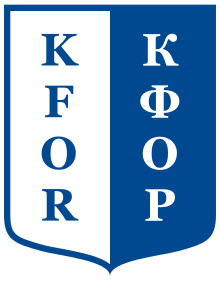
Back قوات كوسوفو Arabic KFOR Azerbaijani KFOR Catalan KFOR Czech KFOR Danish KFOR German Δύναμη Κοσσυφοπεδίου Greek KFOR Esperanto KFOR Spanish Kosovo Force Finnish
| Kosovo Force | |
|---|---|
 | |
| Founded | 11 June 1999 |
| Type | Command |
| Role | NATO peacekeeping |
| Size | 4,443 military personnel[1] |
| Part of | |
| Nickname(s) | "KFOR" |
| Engagements | Yugoslav Wars[2] |
| Website | jfcnaples.nato.int/kfor |
| Commanders | |
| Commander | Major general Özkan Ulutaş, Turkish Armed Forces |
| Deputy Commander | Brigade-general József Szpisják, Hungarian Ground Forces |
| Chief of Staff | BG John Bozicevic, US Army |
| Command Sergeant Major | Primo luogotenente q.s. Marcello Carlo Pagliara, Italian Army |
| Insignia | |
| Flag |  |
The Kosovo Force (KFOR) is a NATO-led international peacekeeping force in Kosovo.[2] Its operations are gradually reducing until Kosovo's Security Force, established in 2009, becomes self-sufficient.[3]
KFOR entered Kosovo on 11 June 1999,[4] one day after the United Nations Security Council adopted the UNSC Resolution 1244. At the time, Kosovo was facing a grave humanitarian crisis, with military forces from Yugoslavia in action against the Kosovo Liberation Army (KLA) in daily engagements. Nearly one million people had fled Kosovo as refugees by that time, and many permanently did not return.[3]
KFOR is gradually transferring responsibilities to the Kosovo Police and other local authorities. Currently, 28 states contribute to the KFOR, with a combined strength of approximately 3,800 military personnel.[5]
The mission was initially called Operation Joint Guardian. In 2004, the codename for the mission was changed to Operation Joint Enterprise.
- ^ "Contributing Nations". jfcnaples.nato.int. NATO (Official website). Retrieved 7 February 2024.
- ^ a b Khakee, Anna; Florquin, Nicolas (1 June 2003). "Kosovo: Difficult Past, Unclear Future" (PDF). Kosovo and the Gun: A Baseline Assessment of Small Arms and Light Weapons in Kosovo. 10. Pristina, United Nations Interim Administration Mission in Kosovo and Geneva, Switzerland: Small Arms Survey: 4–6. JSTOR resrep10739.9. Archived (PDF) from the original on 30 June 2022. Retrieved 3 March 2023.
Kosovo—while still formally part of the so-called State Union of Serbia and Montenegro dominated by Serbia—has, since the war, been a United Nations protectorate under the United Nations Interim Administration Mission in Kosovo (UNMIK). [...] However, members of the Kosovo Serb minority of the territory (circa 6–7 per cent in 2000) have, for the most part, not been able to return to their homes. For security reasons, the remaining Kosovo Serb enclaves are, in part, isolated from the rest of Kosovo and protected by the multinational NATO-led Kosovo Force (KFOR).
- ^ a b "NATO's role in Kosovo". nato.int. 29 November 2018. Retrieved 6 December 2018.
- ^ "Defense.gov News Article: Larger Kosovo Force Takes to Field". archive.defense.gov. Archived from the original on 30 September 2017. Retrieved 8 April 2017.
- ^ "NATO Mission in Kosovo (KFOR)". shape.nato.int. Retrieved 6 February 2024.
© MMXXIII Rich X Search. We shall prevail. All rights reserved. Rich X Search